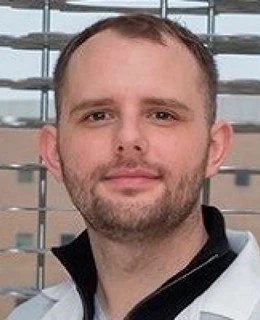
Michael Eerhart
Post-Doctoral Research Associate

Organ transplants, once the moonshots of modern healthcare, are now part of the medical mainstream. Tens of thousands of livers, kidneys, hearts and lungs are transplanted every year thanks in part to innovations pioneered at the University of Wisconsin (UW) School of Medicine and Public Health, one of the busiest transplant centers in the US where the ranks of specialists now includes Michael Eerhart, a graduate of Saba University School of Medicine.
Michael headed to Saba after graduating from the University of Rhode Island (URI) with a BS in Biological Sciences (and a Chemistry minor). At URI, Michael was also a teaching assistant in the Human Anatomy laboratory and an undergraduate research fellow—all good preparation for the intense medical studies at Saba.
“Going to Saba was definitely an adventure. A real benefit is that the students get really close. Having no distractions really did help with studying and I found being with such a diverse student body really opens your eyes to the rest of the world.”
Michael did his clinical rotations in Atlanta, Florida and Bridgeport (“an amazing hospital”) and with a great score on the USMLE Step 1 was well prepared to get a great residency, which he did: first, a General Surgery Residency-Preliminary at Geisinger Medical Center in Pennsylvania and then the two-year Transplant Surgery Research Fellowship at UW.
Founded in the mid-1960s, the UW Transplant Program has been responsible for a range of important discoveries including the development of the gold standard organ preservation solution, known as the “UW Solution.” Hundreds of organ transplants are performed there every year. Michael is a Post-Doctoral Research Associate in the Transplant and Islet Research Lab in the Division of Transplantation, which is part of the UW Department of Surgery.
Michael was originally drawn to trauma surgery. He helped a friend in high school recover from a car crash and was also an EMT while going to college. But the more he worked with organ transplants, the better he liked that part of medicine.
“Surgical cases in transplant involve a very wide range of techniques depending on the organ being transplanted,” he explained. “As I rotated through the transplant service during my PGY-2 year I found it a better fit. I felt like it offered the opportunity for a closer long term relationship with patients and their families that I found myself missing during my trauma rotations.”
For prospective students
Saba is committed to supporting prospective students with any questions or queries throughout the application process. Please see the following links for detailed information about each topic
If the information you are seeking is not provided here, please get in contact by contacting via WhatsApp here.